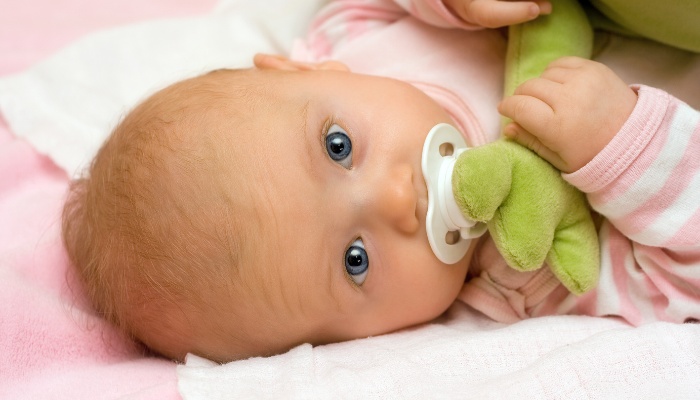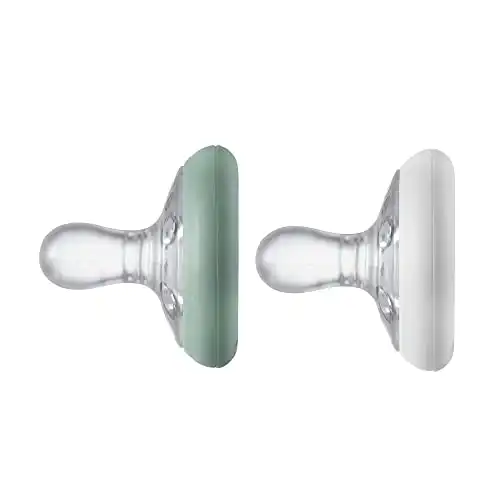Pacifiers are often a relief for parents, as they can have a calming and soothing effect on their child, reducing crying and serving as a distraction during uncomfortable moments such as shots.
With that in mind, can pacifiers also be a good thing while they sleep?
Sleeping with a pacifier can be beneficial for your baby’s sleep quality and well-being as it helps them to self-soothe, provides a pain-relieving effect, and is even believed to reduce the risk of SIDS (sudden infant death syndrome) due to the gap created between the mattress and baby’s face.
There are many positive arguments for giving your baby a pacifier at night, but the trade-off for a sounder sleep now may mean a stronger dependence on them down the line, not to mention potential health risks.
To help you make the best decision on using binkies at bedtime for your little one, we’ll discuss the benefits, risks, and safety issues of pacifiers and answer your common questions about their use.
Sleeping With a Pacifier – What To Know
Pacifiers help babies feel soothed during the day, so surely binkies are a no-brainer during the night too, right?
There are certainly some great advantages to letting them sleep with a pacifier, but it’s important to know the drawbacks, how suitable they are for newborns, and how long to use them.
Are Pacifiers Good for Babies?
Though pacifiers are thought of as anti-crying devices for the mom and dad’s sake, they can also help your baby to sleep more soundly and for longer as the sucking motion can help babies to develop better breathing muscles and nerve reflexes.
Binkies may also play a big part in allaying a parent’s biggest anxiety during the night.
With a pacifier in their mouths during sleep, babies are less likely to roll over onto their stomachs, and the pacifier prevents their faces from getting too close to their crib mattress.
Studies have shown this to greatly reduce the risk of SIDS (sudden infant death syndrome).
Benefits of Using a Pacifier
A pacifier may not the magic solution for every baby, but the use of pacifiers does provide some benefits:
- If baby wakes up during sleep or nap time, pacifiers can be wonderfully self-soothing, teaching them to fall back to sleep when irritable.
- The nipple shape helps them feel closer to mommy at night (especially those with a natural skin-like texture).
- Pacifiers may help with pain relief associated with a vaccination or minor injury according to family medicine doctor Genevieve Brauning: “It reduces how a baby senses pain and makes him more comfortable.”
- Some pacifiers on the market are specific to teething, helping your baby to sleep with less discomfort and pain during this phase.
- According to pediatricians at Sleep Foundation, pacifiers can help to keep your little one’s airways open by pushing the tongue forward and can even help to regulate their heart rate during sleep.
- Pacifiers may also help to encourage preemies and young babies with poor sucking reflexes.
- Symmetrical design means no ‘wrong’ side up - it will always be correctly placed in baby’s mouth.
- Inspired by Tommee Tippee's award-winning Closer to Nature® nipple.
- BPA-free and easy to clean.
Pacifier Side Effects
There’s a risk that relying on a pacifier for long periods, such as during the night, may lead babies to depend on pacifiers to self-soothe while awake during the day.
This long-term use of pacifiers can lead to other problems including…
Dental Issues
If your little one comes to use pacifiers well into their toddler years, this can lead to problems like overbites and cross-bites where the teeth alignment is crooked due to the pacifier being kept behind the front teeth.
Your baby’s jaw and gums are very malleable at this age, so try to kick the pacifier habit by age 3 to prevent possible complications.
Ear Infection Risks
Studies have demonstrated a link between continual pacifier use and ear infections.
This is thought to be due to the change in pressure behind your baby’s ear during the sucking and swallowing motion as fluid can shift into the middle ear.
Possible Weight Gain
While explanations as to why are largely unclear, a study on childhood obesity has found a correlation between pacifier use beyond 4 months and accelerated infant growth, with babies more likely to be overweight by ages 1 and 2.
Can I Give My Newborn a Pacifier at Night?
In certain situations, newborns may benefit from pacifier use at night.
Preterm babies, for example, can have trouble coordinating their breathing, sucking, and swallowing reflexes, so a pacifier may help them to practice this oral stimulation to help with feeding success.
As there is no one-size-fits-all pacifier, be sure to choose the right size for newborns (normally labeled 0-6 months), and opt for a silicone one-piece pacifier as these are durable and odor-free and won’t break into parts that could pose a choking hazard.
Can a Baby Sleep With a Pacifier All Night?
Yes, it is perfectly safe to let your little one sleep with a pacifier throughout the night, ensuring the pacifier is the appropriate size for their age, is designed with breathing holes in the mouth guard, and is regularly disinfected with hot water.
A little later, we’ll discuss extra pacifier safety tips to keep in mind each night.
Should I Remove Pacifier When Baby Is Sleeping?
Removing their pacifier mid-sleep could cause them to wake up, so we wouldn’t recommend it!
If their pacifier falls out during the night though, don’t place it back in their mouths as it could be covered in germs.
How Long Should a Baby Sleep With a Pacifier?
For the sake of your baby’s dental development and preventing dependence on them, it’s generally a good idea to start the process of weaning them off their beloved binkies from about 6 months to a year.
Aim to be pacifier-free well before their second birthday to prevent speech issues.
Can I Give My Newborn a Pacifier While Breastfeeding?
Yes, but be careful of the timing. Advice from the American Academy of Family Physicians suggests that pacifiers are best introduced when your little one already knows how to breastfeed (by about 4 weeks old).
For clarification, the AAP suggests waiting until your milk supply is well established, nursing is progressing well, and baby has begun to latch on correctly.
Benefits of Not Using a Pacifier
Advantages of foregoing pacifiers include:
- Reduced risk of ear infections and dental issues.
- You’ll avoid the difficult and much-dreaded pacifier weaning period!
- It may improve breastfeeding success as extensive and early pacifier use can cause babies to prefer the pacifier compared with the effort and specific technique of breastfeeding.
- They may be better able to self-soothe when anxious or irritable in the future instead of relying on a pacifier, stuffed toy, or comfort blanket (12 months and up).

Pacifier Safety
Safety should always be top priority, even with seemingly harmless items like pacifiers.
- Never sugarcoat the pacifier nipple in honey or other sweet substance to encourage them to take it. Not only can it cause cavities, but honey can cause infant botulism and even death in babies under 1 year.
- Always keep the pacifier clean – Boil pacifiers, or put them in the dishwasher before baby is 6 months, and wash in warm soapy water after baby is 6 months.
- Watch out for signs of wear and tear as bacteria can get into cracks in the material.
- Never attach a long ribbon or string to the pacifier as this can be a strangulation hazard. Opt instead for a pacifier with a pull ring (which most styles have).
Tips for Getting Baby To Sleep
Because your baby won’t always be able to rely on a pacifier to self-soothe, here are a few helpful tips for getting them to sleep during the transition away from their pacifier and beyond.
1. Put Them To Bed Drowsy but Awake
Putting them to bed asleep with the pacifier still in won’t teach them to self-soothe naturally, but if you make sure they are still awake but drowsy when you put them to bed, you’re helping them learn how to fall back to sleep.
2. Keep to a Solid Nap Schedule
By 12 months, your little one still needs to nap between 3 and 4 hours each day, so maintain a healthy nap routine for their age as good undisturbed naps can translate to sounder bedtime sleep.
3. Enjoy Some Sunshine
Help your baby’s developing circadian rhythm along by spending plenty of time in the daylight.
At around 3 months, your baby’s sleep and wake cycle begins to set in and become more regular, but too much time spent indoors can disrupt that.
4. Consider Sleep Training Methods
As they transition from the pacifier, you may want to explore some sleep training methods, such as letting baby cry it out or the checking-and-consoling method of allowing them to cry for a period before comforting.
Related Questions:
Can Babies Sleep With a Ceiling Fan On?
Yes, sleeping under a ceiling fan is perfectly safe for your baby and can even help to promote sounder sleep and lower the risk of SIDS thanks to the increased ventilation.
The background white noise provided by the low hum of ceiling fans may also be quite soothing for your little one.
Should Babies Sleep in the Dark?
Babies usually develop their circadian rhythm (which helps regulate their internal sleep and wake cycle) at around 2-4 months, so it’s good to let them sleep in a dark environment as early as possible as this will help to support the sleep hormone melatonin.
Closing Thoughts
In summary, pacifiers can be super helpful for your baby during the night as they can help with pain associated with teething and irritability but may also help to reduce the risk of SIDS and help strengthen sucking reflexes in preemies.
Don’t forget to make your child’s pediatrician aware of their pacifier use so they’re able to check for any health issues as they develop and advise the best time to stop using them.
Mom of three (including identical twin boys), wife, and owner of Parents Wonder. This is my place to share my journey as a mother and the helpful insights I learn along the way.


